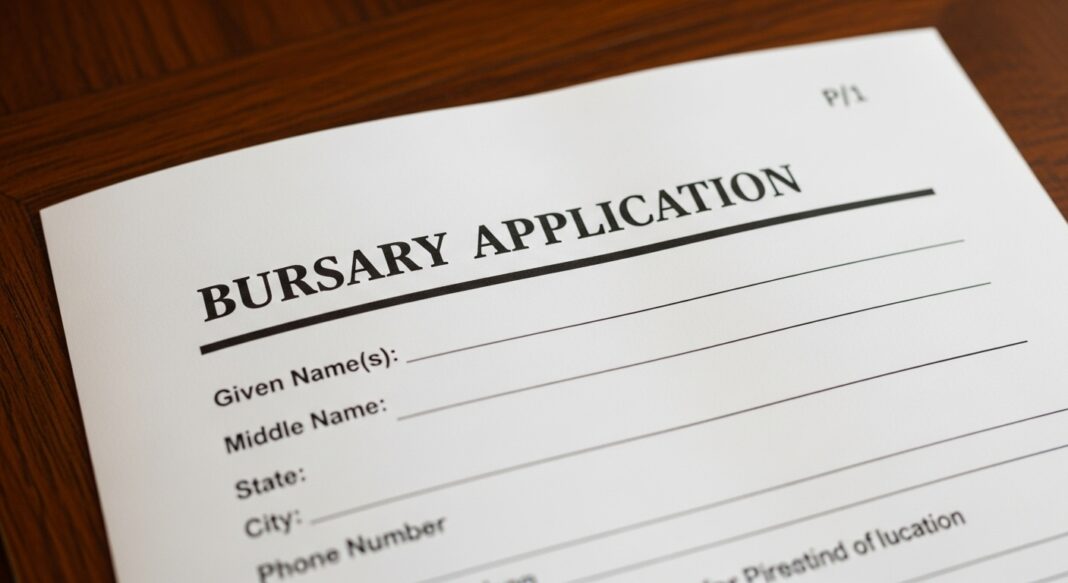HOW TO WRITE A BURSARY APPLICATION LETTER: COMPLETE GUIDE FOR ZAMBIAN STUDENTS
Your bursary application letter could be the deciding factor between receiving funding and being rejected. In Zambia, a handwritten application letter stating the loan category and clearly explaining your field of study, age, contact details, and reasons for deserving the bursary is a mandatory requirement. This comprehensive guide teaches you how to craft a compelling bursary application letter that stands out to selection committees.
Why Your Bursary Application Letter Matters
Your letter serves as your voice to the bursaries committee. While grades certainly matter, your letter must explain why you deserve the loan and include a study plan detailing your preferred course and how your intended studies will enhance your contribution to Zambia’s development. Essentially, this is your opportunity to create an emotional connection and demonstrate your genuine need and commitment. Remember, securing a bursary is crucial—as we discussed in How to Apply for a Bursary in Zambia, your application letter is just one component of the entire funding process.
How to Write a Bursary Application Letter: Basic Structure
A successful bursary application letter follows this proven structure:
1. The Header Section
Begin by including your personal information at the top of the page:
- Your full name
- Your residential address
- Your phone number (daytime contact preferred)
- Your email address
- The date of writing
After this section, leave a line space before addressing the letter to:
- The Chairperson, Bursaries Committee
- Ministry of Education
- P.O. Box [number] Lusaka, Zambia
2. The Salutation
Start with a professional greeting such as:
“Dear Sir/Madam,” or “Dear Members of the Bursaries Committee,”
3. The Opening Paragraph
Your opening should immediately capture attention and set the tone. To do this effectively:
- State your purpose clearly and directly
- Reference the bursary advertisement (include the date and publication)
- Mention the funding level you’re seeking (25%, 50%, 75%, or 100%)
For instance, you might write: “I am writing to formally apply for a student bursary under the 2025 Zambia Universities Student Loan scheme, as advertised in the Times of Zambia on [date]. I am applying for [50%/75%/100%] funding to pursue my studies in [field] at [University name].”
4. The Main Body
This section is where your letter truly shines and where you demonstrate your worthiness. Therefore, divide this section into 3-4 distinct paragraphs:
Paragraph 1: Your Academic Background
Here, highlight your Grade 12 results or current academic performance. Additionally, mention any achievements and strengths that make you stand out. Most importantly, explain why you’re a worthy investment in terms of academic potential.
Paragraph 2: Your Financial Situation
In this paragraph, clearly explain why you need financial assistance. Describe your family circumstances honestly and transparently. Crucially, be candid but maintain dignity—avoid excessive emotional language that might seem manipulative.
Paragraph 3: Your Study Plan & Career Goals
Next, clearly state which course you want to pursue. Then explain why you chose this particular field. Importantly, describe how your intended course of study will enhance your contributions to Zambia’s development (keeping this to 200-400 words). Finally, show how the bursary will help you complete your studies successfully.
Optional Paragraph 4: Your Character & Commitment
Additionally, mention any leadership roles or community service you’ve undertaken. Furthermore, demonstrate your maturity and responsibility through concrete examples. Subsequently, show how you’ll use your education to give back to society.
5. The Closing Paragraph
End your letter powerfully with these elements:
- A summary statement reinforcing your key message
- Your commitment to academic excellence
- A subtle call to action
For example, you might conclude: “I am confident that with your support, I will not only complete my degree successfully but also contribute meaningfully to Zambia’s development. I am prepared to meet all requirements of the bursary scheme and would appreciate the opportunity to discuss my application further.”
6. The Closing
Sign off professionally using one of these options:
- “Yours faithfully,” (when you don’t know the recipient’s name)
- “Yours sincerely,” (when you do know the name)
Include both your handwritten signature and your typed name.
How to Write a Bursary Application Letter for University
University bursary applications require a noticeably more sophisticated approach compared to secondary school applications. Consequently, here’s what distinguishes them:
Focus on Academic Achievement
Universities naturally expect higher performance standards. To meet these expectations, highlight:
- Your Grade 12 exam scores prominently
- Details from your university admission letter
- Your current academic standing (if already enrolled)
Demonstrate Maturity
Furthermore, showing that you’re ready for university life is essential. To accomplish this:
- Explain your chosen field of study in considerable depth
- Connect it to your career aspirations and national development needs
- Discuss any relevant work experience or internships you’ve completed
Address Specific University Requirements
Additionally, different universities may have requirements beyond the national bursary application. Therefore, check your specific institution’s guidelines and address them directly in your letter.
Level Application Letter
[Your contact information]
20 June 2025
The Chairperson, Bursaries Committee, Ministry of Education, P.O. Box 50093, Lusaka, Zambia
Dear Sir/Madam,
I am writing to apply for a student bursary under the 2025/2026 Zambia Universities Student Bursary scheme, as advertised in the Times of Zambia on 15 June 2025. I am seeking 75% financial support to pursue a Bachelor of Science in Agricultural Science at the University of Zambia, commencing in September 2025.
My Grade 12 results demonstrate my academic capability, having obtained an A in Biology, Chemistry, and Mathematics in 2024. Furthermore, my passion for agriculture stems from growing up in a farming community where I witnessed firsthand the challenges rural farmers face daily. Consequently, I am determined to use my education to develop sustainable farming solutions that will improve productivity for smallholder farmers across Zambia.
My family’s financial situation unfortunately makes it impossible for my parents to pay university tuition fees. My father is a small-scale farmer whose income fluctuates seasonally, while my mother manages the household without stable employment. Without this bursary, my educational aspirations would remain unfulfilled. Significantly, I would be the first in my family to reach university level, and this opportunity would transform not only my life but my family’s entire future.
I have selected Agricultural Science because Zambia’s food security depends critically on improving farming techniques and farmer productivity. Through this degree, I will develop expertise in sustainable farming practices, agricultural technology, and soil management. Upon graduation, I aim to establish an agricultural extension service in my district, thereby directly supporting local farmers in increasing crop yields while protecting our environment. This aligns perfectly with Zambia’s Vision 2030 and national development priorities.
During secondary school, I served as Science Club President, demonstrating my leadership and passion for my field. Moreover, I have maintained excellent attendance and have never failed an examination. Consequently, I am confident that with your support, I will graduate with distinction and dedicate myself to serving rural Zambia.
I would be deeply grateful for the opportunity to receive this bursary and assure you of my commitment to utilizing this investment wisely.
Yours faithfully,
[Handwritten signature]
Chisomo Banda
Secondary School Bursary Application Letter
Students pursuing secondary school bursaries must adjust their approach considerably. As a result, here are the key modifications:
Key Differences for Secondary School Letters
- Focus on potential rather than past achievement
- Emphasize motivation and character development
- Connect education to family aspirations and dreams
- Demonstrate financial hardship clearly yet respectfully
Sample Secondary School Bursary Application
[Your contact information]
May 20, 2025
The Chairperson, District Bursaries Committee, District Education Office, [Your District], Zambia
Dear Sir/Madam,
I am writing to apply for a secondary school bursary to enable me to continue my education at [School Name] in Form One, starting in 2025. Unfortunately, my family is unable to pay school fees, and without this support, my education will be interrupted.
I completed my Grade 7 examination in 2024 and achieved a Grade B overall, with particularly high scores in English and Mathematics. And I am determined to work hard throughout secondary school. My parents are very proud of my achievement, but they are struggling financially to pay for my secondary education.
My father passed away three years ago, leaving my mother to support our family as a market vendor with very limited income. Additionally, my grandmother lives with us, and she is elderly and unable to work. Furthermore, my younger sisters also need support from our limited family resources. Despite these considerable challenges, my family has made great sacrifices to see me succeed. Therefore, your support will help me finish secondary school and eventually attend university to pursue a better career.
I promise to work hard, maintain good behavior, and make the best use of this opportunity you are considering.
I thank you sincerely for considering my application.
Yours faithfully,
[Handwritten signature]
Mwila Mulenga
Best Bursary Motivation Letter: Tips to Stand Out
Your motivation letter must do far more than simply state facts—it must inspire the selection committee to invest in you. Therefore, here are essential strategies:
Writing Strategy for Best Results
Be Specific, Not Generic
Avoid vague phrases like “I want to help my country” without any explanation. Instead, be precise: “I will establish a rural clinic in my community to serve 5,000 underserved residents.” The difference is remarkable—specific goals convince committees far more effectively than general statements.
Show, Don’t Tell
Rather than claiming “I’m hardworking,” describe concrete evidence: “I wake at 5 AM to study before helping my mother sell goods at the market.” This narrative approach allows readers to reach their own conclusions about your character.
Create a Narrative Arc
Effective motivation letters follow this pattern:
- Begin with where you are now (the challenge you face)
- Move to where you want to go (your future goal)
- Explain how education serves as your bridge (the solution)
Connect to National Priorities
Furthermore, consider these important connections:
- Reference Zambia’s Vision 2030 specifically
- Link your studies directly to national development needs
- Show how you’ll contribute to solving real problems
Demonstrate Self-Awareness
Additionally, acknowledge the privilege of receiving bursary support. Most importantly, explain what you’ll do with it. Subsequently, show genuine gratitude and demonstrate your commitment to repaying this investment in your future.
Common Mistakes in Bursary Motivation Letters
Mistake 1: Excessive Emotion
❌ “My life is so hard and unfair. I suffer so much.” ✓ “My family’s circumstances require me to be resourceful and independent.”
Mistake 2: Unrealistic Claims
❌ “I will be President of Zambia” ✓ “I will become a qualified teacher to improve quality education in rural areas”
Mistake 3: Poor Grammar and Spelling
Always proofread multiple times before submission. Moreover, have someone else review your letter carefully. Additionally, use a spell-checker, but don’t rely solely on automated tools.
Mistake 4: Exceeding Length Requirements
- For secondary school applications: 1-2 pages maximum
- For university applications: 2-3 pages maximum
- Respect any word limits if specified in the requirements
Mistake 5: Generic Content
Furthermore, personalize every application thoroughly. Include specific course names and universities. Also, reference the exact bursary you’re applying for, not a generic version.
HELSB Bursary Application Letter Requirements
The Higher Education Loans and Scholarships Board (HELSB) requires that your handwritten application letter clearly state your loan category (25%, 50%, 75%, or 100%), your field of study, age, daytime telephone number, and email address for communication purposes.
What HELSB Specifically Wants to See
- Clear categorization of the funding level you’re seeking
- Evidence that you understand the loan must be repaid
- Explanation of why you deserve the specific funding level
- Commitment to academic excellence and performance
- Plan for how you’ll repay the loan post-graduation
Formatting and Presentation Tips
The Golden Rules
Rule 1: Handwrite Your Letter
Bursary applications require a handwritten letter, not a typed document. Consequently:
- Use black or blue pen exclusively
- Write clearly and legibly throughout
- Practice your handwriting beforehand if necessary
Rule 2: Use Good Quality Paper
Furthermore, paper quality matters:
- Choose white or light cream A4 paper
- Avoid colors or decorative patterns
- Select paper that’s not too thin (avoid tissue-like materials)
Rule 3: Maintain Professional Appearance
Additionally, presentation is crucial:
- Establish proper margins (1 inch on all sides)
- Use single spacing within paragraphs, double between sections
- Avoid corrections or cross-outs (rewrite if you make a mistake)
Rule 4: Include All Required Information
Importantly, ensure your letter contains:
- Your full name and complete contact details
- The date of writing
- Formal address to the Bursaries Committee
- All required supporting documents attached
Rule 5: Keep Copies
Finally, make photocopies before submission. Additionally, keep records of where and when you applied. Subsequently, save the application checklist for future reference.
Timeline: When to Write Your Letter
- June-July: Watch carefully for bursary advertisements
- Within 1 week of seeing the advert: Start researching all requirements
- 2 weeks before deadline: Begin writing your draft
- 1 week before deadline: Finalize and get feedback from trusted people
- 3 days before deadline: Prepare final copies for submission
- Day before deadline: Have everything organized and ready
Related Learning Resources
As you prepare your bursary application letter, remember that it’s just one piece of the larger funding puzzle. For comprehensive guidance on the entire application process, check out How to Apply for a Bursary in Zambia, which covers everything from eligibility requirements to university selection. Additionally, if you’re considering supplementary income while studying, How to Make Money Online in Zambia 2025 – Phone, No Investment, Free Methods offers practical strategies for earning alongside your education.
Checklist Before Submission
Before you submit your bursary application letter, carefully verify each item:
✓ Letter is handwritten in black or blue ink ✓ Your contact information is complete and correct ✓ You’ve stated the specific loan category you’re seeking ✓ You’ve clearly explained your field of study ✓ Your financial need is evident but not overly emotional ✓ Your study plan is included and compelling ✓ Grammar and spelling are correct throughout ✓ Letter is 2-3 pages (not too short, not too long) ✓ You’ve included all required supporting documents ✓ You’ve met the application deadline ✓ You’ve kept copies for your records ✓ Your contact number and email are easy to reach
Key Takeaways
Writing a successful bursary application letter requires several essential elements:
- Clarity: Be specific about what you want and explain why clearly
- Honesty: Share your genuine financial situation and realistic goals
- Professionalism: Maintain formal language and proper formatting throughout
- Passion: Show your commitment to education and national development
- Preparation: Gather all documents and plan your writing well in advance
Your bursary application letter represents your opportunity to tell your story to decision-makers. Therefore, make it count. With this comprehensive guide, you now have everything necessary to write a compelling, professional application that maximizes your chances of receiving funding.
For more business and career guidance, visit zambiaguardian.com for entrepreneurship news and economic analysis.


